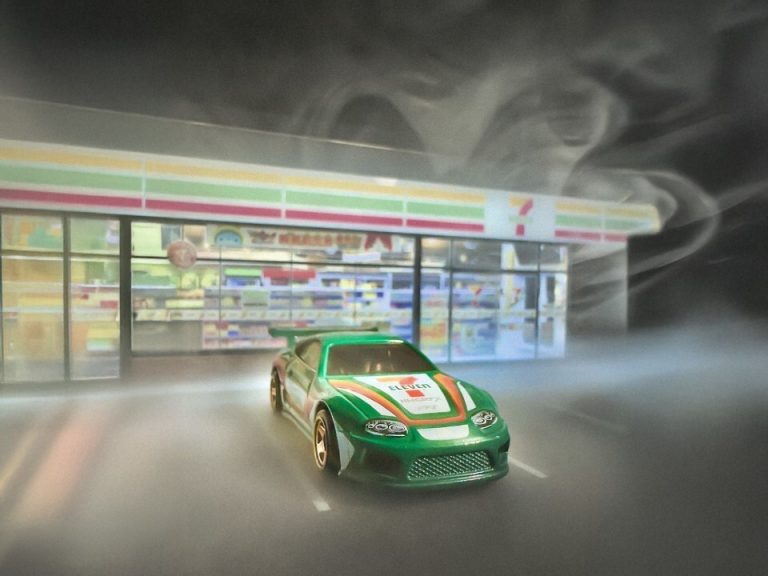What is nostalgia marketing? Imagine you’re eight years old, racing Hot Wheels cars down plastic orange tracks in your bedroom, competing against friends to see whose car could zoom the fastest or perform the best stunt. Or perhaps you’re a teen captivated by the iconic orange Toyota Supra speeding across the screen in “The Fast and the Furious,” wishing one day to own something equally thrilling. These experiences aren’t just fleeting memories; they form emotional connections that savvy franchisors leverage through strategic brand collaborations, driving consumer loyalty and engagement through nostalgia.
The Power of Nostalgic Connections
Franchises understand the powerful bond nostalgia creates between consumers and brands. A recent collaboration between retail giant 7-Eleven and toy legend Mattel, Inc. exemplifies this strategy, leveraging cherished memories to ignite consumer passion. By launching the first-ever branded Hot Wheels die-cast car, the 7-Eleven x Hot Wheels Silver Series Toyota Supra, the brands tap directly into consumer nostalgia, merging two beloved entities into a collectible that transcends generations.
Marissa Jarratt, Executive Vice President and Chief Marketing & Sustainability Officer at 7-Eleven, emphasized the significance of this connection, stating, “We’re excited to partner with Hot Wheels, another iconic brand that, like 7-Eleven, has fueled imaginations and created lasting memories for generations.” Jarratt’s words underscore the essence of nostalgia marketing—a potent mix of emotional appeal and brand affinity capable of cultivating deep-rooted consumer loyalty.
Nostalgia Marketing Advantage for Franchisors
For franchisors, creating memorable brand connections is paramount. Consumers naturally gravitate toward products and experiences linked to positive memories, whether it’s the taste of a Slurpee enjoyed after school or the thrill of childhood playtime. By tapping into these emotional reservoirs, franchisors can foster loyalty that lasts decades.
7-Eleven’s collaboration with Hot Wheels demonstrates an expert approach to nostalgia marketing. This venture offers collectors and enthusiasts the chance to rekindle their childhood memories while simultaneously engaging with the brand in new, exciting ways. The limited edition Toyota Supra, decked in vibrant 7-Eleven branding, isn’t just a toy; it’s a symbol bridging past experiences with present-day affection, reinforcing customer-brand relationships.
Moreover, 7-Eleven and Mattel didn’t stop at cars. Recognizing the expansive nature of nostalgia, the brands introduced Hot Wheels Skate fingerboards inspired by fan-favorite 7-Eleven products, further broadening the nostalgic appeal. By connecting different facets of consumer nostalgia—from racing toy cars to fingerboarding—the companies deepen their customer engagement strategies.
Expanding the Reach through Merchandising
Another critical component of this nostalgia-fueled strategy lies in merchandising. To amplify excitement and expand consumer interaction, 7-Eleven rolled out an exclusive line of merchandise alongside the Hot Wheels launch. Retro-inspired apparel, including collectible t-shirts, sweatshirts, and pins, allows customers to publicly showcase their nostalgic affinity, driving further brand visibility and engagement.
This merchandising strategy effectively transforms customers into brand ambassadors, organically amplifying the franchise’s reach. Enthusiasts wearing branded gear inherently share their nostalgic connections with others, creating a network of consumer-led brand promotion that traditional marketing alone can’t achieve.
Engaging Multiple Generations through Shared Memories
The success of nostalgia marketing isn’t limited to those who originally experienced these memories firsthand. Parents sharing their childhood joys with their children expand brand relevance across generations. The 7-Eleven x Hot Wheels collaboration becomes a conduit for bonding moments, enabling older generations to pass down their passions and create new memories anchored to familiar brands.
This intergenerational appeal amplifies franchise reach, ensuring continuous brand renewal and loyalty growth. Parents reliving their Hot Wheels adventures through their children’s excitement create new emotional connections, establishing an enduring cycle of brand affinity.
Beyond Nostalgia: Creating New Memories
While nostalgia forms the foundation of these marketing efforts, franchises must also focus on creating contemporary memories. The collaboration between Mattel and 7-Eleven exemplifies this dual strategy. Honoring past experiences while simultaneously offering fresh, exciting products that today’s younger consumers find compelling.
The vibrant design of the limited-edition Toyota Supra and collectible fingerboards appeal to modern tastes, ensuring relevance for new audiences. Thus, nostalgia serves as a springboard rather than a boundary, propelling franchises toward innovative marketing that honors the past and embraces the future.
Lessons for Franchise Marketers
For franchise marketers, understanding how to authentically harness nostalgia can significantly enhance brand loyalty and customer lifetime value. Key lessons include:
- Emotional resonance: Products should genuinely connect to consumers’ emotional pasts.
- Authentic collaborations: Partnerships should naturally align, enhancing both brands’ identities.
- Extended merchandising: Offering related merchandise helps maintain engagement beyond the initial product release.
- Intergenerational appeal: Marketing efforts should create opportunities for shared experiences, strengthening cross-generational bonds.
Ultimately, the collaboration between 7-Eleven and Mattel’s Hot Wheels serves as a vivid example of nostalgia marketing’s potent potential. It reminds franchisors of the immense value found in connecting deeply held memories with brand experiences; creating customer loyalty that resonates far beyond a single product or campaign.
In the fast-paced world of franchising, where capturing consumer attention is crucial, nostalgia emerges as a timeless marketing tool, capable of transforming momentary brand interactions into lasting emotional connections.


